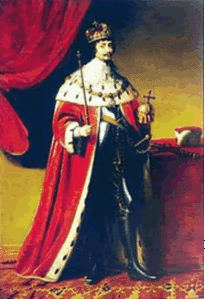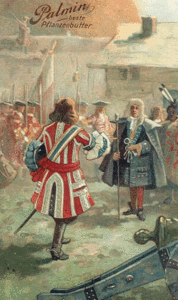List of our Members’ Patriot Ancestors
Why did we choose the name “Palatinate” for our chapter?
Our chapter name originates in ancient Rome. According to legend, Romulus and Remus, the founders of Rome, were raised in the cave of a wolf on the Palatine Hill, one of Rome’s famous seven hills. Later the Palatine became home to some of Rome’s notables including the orator, Cicero, and several Emperors whose magnificent dwellings led to our present word “palace.” Eventually certain Roman officials were given the title “Palatine” when they represented the emperor in far off regions of the empire.
The Germanic emperors and kingsmedieval Europe continued to use this title. As these rulers traveled about their realms, they needed someone in charge at their castles between visits. The Count Palatine (literally “of the palace”) began representing the absent King, and received administrative and judicial powers over the local inhabitants. Some of these counts became extremely powerful in their own right, such as the Count Palatine of the Rhine (Pfalzgraf) who was one of the electors of the Holy Roman Emperor. He controlled a large territory known as the Rhenish or Lower Palatinate which included land on both sides of the Rhine River. Heidelberg was its capital for many years.
In 1329 a portion of northeastern Bavaria came under the control of the Count Palatine. This was known as the Upper Palatinate (Oberpfalz) and bordered the present Czech Republic. Amberg was the capital and Regensburg eventually joined the territory. Boundaries were rather fluid in those days as kings, bishops, and knights played in a grand chess game of alliances and disputes. The Rhenish Palatinate flourished in the 15th and 16th centuries and Heidelberg was an important political and cultural center during the German Renaissance and Reformation. At one time the Palatinate was one of the strongest powers in the German Empire.


|
In 1610, the young Friedrich V became the Elector (Kurfürst) of the Palatinate. In 1613, he took as his bride, Elizabeth Stuart, the eldest daughter of England’s James I.
|
Legend recounts that the festivities in honor of their wedding in London included a performance of “The Tempest” with William Shakespeare taking the part of Prospero. The young couple themselves would be part of a real tragedy a few years later. A Protestant assembly in Bohemia deposed their Roman Catholic king in 1618 and offered the crown to Friedrich who eagerly accepted it. Unfortunately, Hapsburg forces had other plans and without the anticipated support from England and other Protestant factions, Friedrich not only lost Bohemia but his Palatinate territories as well. This was the beginning of the 30 Years War, a largely religious war. Catholic nations fought the growing power of the Protestant states. The area which makes up modern-day Germany was the scene of many horrendous battles, and some areas, such as the Palatinate, suffered the loss of a third of its population, as marauding troops brought destruction, starvation, and the plague. Agriculture and commerce were brought practically to a standstill. Finally it became clear that all were losers in this war, and, for the first time in European history, both sides agreed to sit down to treaty negotiations.
Five years of negotiation brought about the Treaty of Westphalia, signed in 1648, which established the principle of freedom of religion, laying important groundwork for the development of democracy. The Lower Palatinate was returned to Friedrich’s son, Karl Ludwig, who repopulated the Palatinate lands by inviting Protestant refugees from Switzerland, Tyrol, the Savoy, and the Netherlands to settle there.
(By the way, Friedrich’s daughter Sophie married into the family of the Elector of Hanover and her son became George I, King of England.)
Palatinates in America
Unrest and crop failures continued to plague the industrious new Palatinates in the early 18th century. When Queen Anne of England issued an invitation to Protestants to settle in her colonies in the New World across the Atlantic, with free travel and the promise of land, over 12,000 Palatinates responded by traveling to London, many of them Mennonites and Amish. Many of these immigrants settled in Pennsylvania, New York, and Virginia. The first permanent German settlement in America was Germantown, Pennsylvania. (http://www.ulib.iupui.edu/kade/germantown.html).
The designation “Palatinate” soon came to mean any German-speaking immigrant no matter which German state they might have come from.

One of these notable Palatines was the courageous Nikolaus Herchheimer, a Mohawk Valley Farmer.
His grandfather, Johann Jost Herchheimer, emigrated in 1709 from Sandhausen, near Heidelberg. In August 1777, Herchheimer was in command of a militia force which fought against a stronger force of English soldiers and Indians which attacked at Oriskany. Herchheimer’s troops forced the British and Indian forces to withdraw. Herchheimer was severely wounded and died a few weeks after the battle. He prepared himself for death by reading the verses of Psalm 38. Today his home is an historic site in New York.
Another son of the Palatinate arrived to help the American cause in 1780. He was Christian von Forbach, son of the Duke of Zweibrucken. Christian was a colonel in the Infantry Regiment Royal Deux-Ponts, one of the regiments commanded by the French Comte de Rochambeau. Christian and his brother Wilhelm took part in the Yorktown campaign in 1781 and were present when Lord Cornwallis surrendered to General George Washington.
Thus, newly arrived Palatinates who were fighting with the French forces and the Palatinates who had emigrated earlier both contributed to the American victory and to our independence. As early as 1776, Congress acknowledged the large number of German immigrants willing to fight in the War for Independence and established German regiments in Maryland and Pennsylvania. These regiments were led by first by Colonel Nicholas Haussegger and later by Colonel Arendt and General John Peter Muhlenberg.
Many of our members live in the areas that were once under the jurisdiction of a count palatine. Although the present state of Rheinland-Pfalz (Rhineland-Palatinate) includes only land to the west of the Rhine River, parts of Hessen, Baden, and Bavaria were once part of the Palatinate. The geographical and historical significance of the Palatinate as well as the contributions of many “Palatines” during the American Revolution make it an honored and appropriate name for our NSDAR Chapter in Germany.

